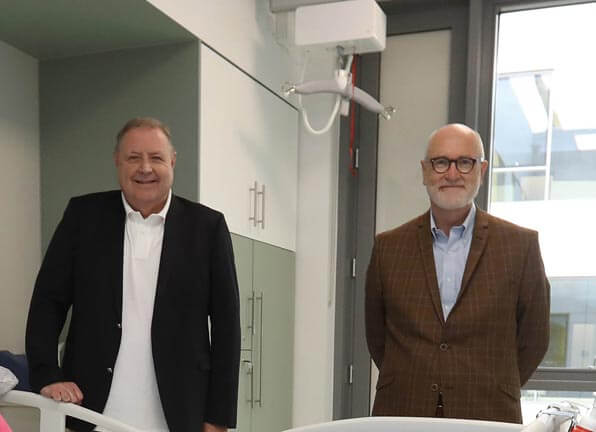All patients in the National Rehabilitation Hospital have been moved into the new purpose designed hospital on the Dun Laoghaire campus. It is the first hospital in Ireland to be specially designed to accommodate the needs of those requiring complex specialist rehabilitation services.

The new hospital provides 120 single ensuite rooms, integrated therapy services, hydrotherapy pool and sports facilities, all of which are specifically designed to ensure optimal outcomes for patents from their rehabilitation programme.
This is the first phase of a three phase development, which will see the number of beds in the hospital almost doubled to 235.
Phase 1 has been designed to link into the existing clinical and non-clinical support services that remain in the existing hospital pending completion of Phase 2. Phase one of the three-phase major capital development is a partnership between the HSE and the NRH.

The building took just three years to complete. The original plan after handover included a six month commissioning, equipping and training period before patients would transition across into the new hospital. However, as the new building includes single ensuite accommodation for every patient and complied with best international practice and infection prevention and control guidelines, staff training was accelerated in the technology, systems and equipment of the new ‘smart’ hospital, and all inpatents were smoothly and successfully moved into into their new accommodatoin in the middle of the COVID pandemic and only six weeks after handover.
CEO, Mr Derek Greene said “This new development will enable staff to deliver optimal quality care and treatment to patients from throughout Ireland who require complex specialist rehabilitation services, in a facility which affords dignity, respect and privacy to all.
“The design is patient-centred and based on the principles of empowerment, dignity, privacy, confidentiality and choice.
NRH Clinical Director, Professor Mark Delargy said, “We are delighted that the transition to the new hospital building was a smooth and successful event for our patients and staff. After so many years waiting for investment in rehabilitation, the new hospital far exceeds expectations. Each patient now has a single en-suite room designed for their comfort and rehabilitation needs. For years we had to fit our patient services into a suboptimal environment. Our old, overcrowded, and cramped Nightingale wards hold many memories for our patients, and these we will keep, but we have gladly left those wards behind.”
This is the first phase of a three phase development, which will see the number of beds in the hospital almost doubled to 235.
“This facility sets a new standard for accessibility and rehabilitation functionality for patients with significant disability. The provision of integrated therapy sessions delivered by Interdisciplinary Teams in the new ward-based therapy facilities will be a huge benefit to patients. Each of our treatment units set new standards for bespoke adult and paediatric rehabilitation.”
This development will also impact positively on staff who will benefit from delivering services in a new and innovative environment designed specifically around patients’ needs. A major recruitment campaign for nursing staff, health and social care professionals, and medical staff is currently underway, with a very positive response to date from Irish and overseas healthcare professionals.
NRH Chairman, Mr. Kieran Fleck said the redevelopment of the NRH has been long outstanding, having been stalled by economic downturns in both 1980 and 2008. “We are very proud of the level of patient and staff engagement in the redevelopment of the NRH. Patients, their families, carers and voluntary agencies have had an integral role to play in the hospital’s development and the design process. Key staff members were actively involved with the design team in every aspect of the design. We now look forward to welcoming new patients to this new state-of-the-art purpose built and designed hospital where the needs of our patients can be met in a world-class rehabilitation facility.
“It is vital that the development of Phase Two of the development is advanced as quickly as possible, as currently Phase One facilitates only some of the hospital services in the new environment, while other services will remain in the old building until completion of Phase Two. There are increased costs and inefficiencies managing and running the hospital across two sites, therefore it is vital that Phase Two be advanced as speedily as possible.
The National Rehabilitation Hospital is the only such dedicated hospital in the country providing complex specialist rehabilitation services for people who have acquired disabilities through accident, injury or illness. Consultant led Specialist Rehabilitation is delivered through comprehensive inpatient, day-patient and outpatient services. In recent years referrals to the hospital have increased as a result of general population increases and survival rates for patients treated in acute hospitals due to advances in medical technology.
Referrals to the hospital have increased as a result of general population increases and survival rates for patients treated in acute hospitals due to advances in medical technology.
Rehabilitation programmes at NRH are tailored to meet the individual needs of adult and paediatric patients in the following areas of specialty:
- Brain Injury (including traumatic and non-traumatic brain injury and other neurological conditions)
- Stroke Specialty Programme
- Spinal Cord Injury
- Prosthetic, Orthotic and Limb Absence Rehabilitation (POLAR)
- Paediatric-Family Centred Rehabilitation
All of the clinical services at the NRH are accredited by CARF (Commission for Accreditation of Rehabilitation) which is an independent, International Accrediting body.
Phase Two provides for the relocation of all existing therapies and support facilities to a new modern development, to serve the new 120 bed hospital. On completion of Phase two the hospital will have optimal efficiency in its operation, and the completion of Phase two will facilitate the demolition of the existing hospital buildings and the development of the further phase(s) to increase the bed and service capacity of the hospital.
Phase Three includes the completion of the 235 bed hospital in accordance with an NRH updated brief for the long term development of the campus.

